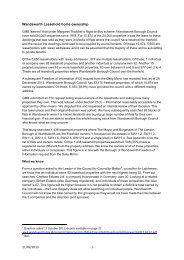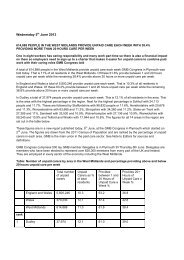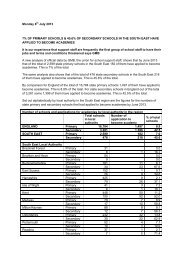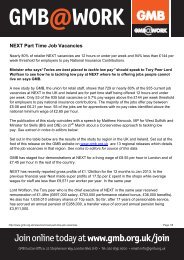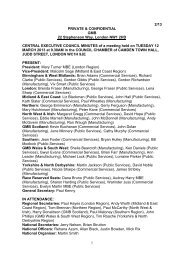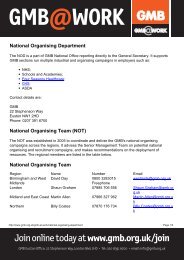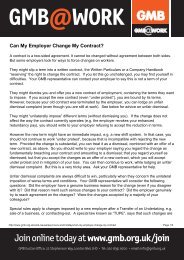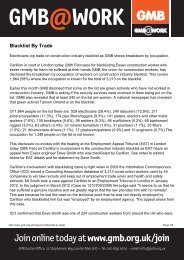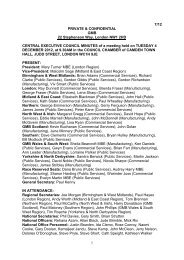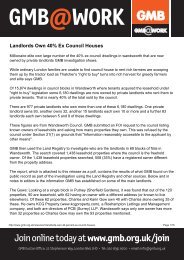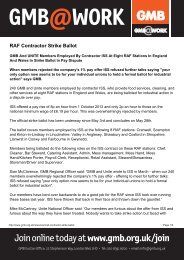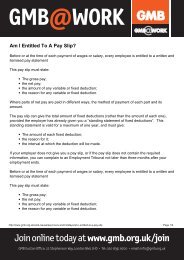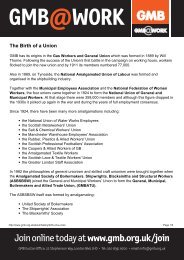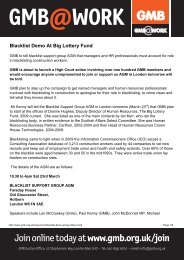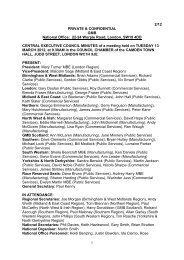WO toolkit 2012 complete.pdf - GMB
WO toolkit 2012 complete.pdf - GMB
WO toolkit 2012 complete.pdf - GMB
You also want an ePaper? Increase the reach of your titles
YUMPU automatically turns print PDFs into web optimized ePapers that Google loves.
SECTION 17.2<br />
JARGON BUSTER<br />
Access<br />
Refers to the methods by which people with a range of needs(such as disabled people,people with<br />
children,people whose first language is not English)find out about and use services and information.<br />
Advocacy<br />
As far as possible,advocacy helps people who are at risk of being excluded to get their point across,<br />
speak up for themselves,get organised.<br />
Ageism<br />
Discrimination against people based on assumptions and stereotypes about age.<br />
Anti-Semitism<br />
Unfounded hostility towards the Jewish faith and people.<br />
Asian<br />
Refers to people who self define as being Asian,East African Asian,British Asian or originate from India,<br />
Bangladesh,Pakistan,Sri Lanka,Nepal or China.<br />
Bisexual<br />
A man or woman who is emotionally,physically and/or sexually attracted to both men and women.<br />
Black,Asian and Minority Ethnic Groups<br />
An inclusive term that refers to all ethnic groups who have a common experience of discrimination on<br />
the basis of their skin colour.It also includes those who self-define as black.In relation to statistical<br />
data collection,such as the census,black has been more narrowly defined to refer to people who self<br />
define as any of the black or black British categories which are: African,Caribbean,or black other.<br />
Legal Burden of Proof<br />
Once an individual can show that there is an issue of potential discrimination,the burden of proof<br />
shifts to the employer to defend the case and show that the reason for the difference in treatment is<br />
justifiable and not discriminatory.In the absence of a reasonable explanation,a tribunal will draw the<br />
inference that discrimination occurred.Previously the complainant had to prove that they had been<br />
discriminated against.Now the employer needs to prove that they did not discriminate.<br />
Consultation<br />
Consultation with those likely to be affected by a policy is integral to good policy making&<br />
implementation.Public authorities are also legally obliged when making decisions to take into account<br />
consultation with its stakeholders.This consists of active involvement and engagement with<br />
consultees e.g.genuine dialogue,when proposals are still in the formative stage.To be effective,<br />
consultation must be thoroughly prepared,planned and properly resourced.It respects those being<br />
consulted at all stages of the process,by allowing enough time,by using flexible and varied approaches,<br />
and by giving feedback on the results and action to be taken.It is coordinated within the organisation<br />
and with partner organisations.It is a continuous process with results monitored and evaluated so<br />
that progress and change can be measured.If no consultation has taken place,then the public<br />
authority could be open to legal challenge.



